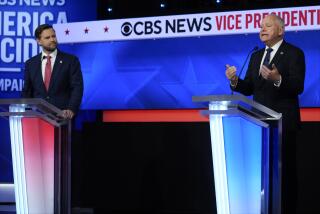‘Multispeak’ Obscures Debate Over Migrants
WASHINGTON — In less than a week, the Bush administration has sent out what at first appear to be conflicting signals over how to deal with an estimated 8 million to 11 million illegal immigrants, mainly Latinos.
Answering questions at a south Florida town hall meeting last week, Homeland Security Secretary Tom Ridge said granting undocumented immigrants some form of legal status would make sense. But at his news conference Monday, President Bush asked to set the record straight and declared that his administration is “firmly against blanket amnesty.” From those statements alone, one might conclude that Bush and a key member of his Cabinet disagree on what Republican supporters of strict immigration enforcement consider a defining issue.
Not so, say administration officials and immigration policy experts.
Instead, the seeming contradiction stems from the confusing language of the immigration debate -- what one expert called “multispeak.” Legalization may sound a lot like amnesty to the average person, but when it comes to immigration, the two terms mean different things.
“Amnesty” has come to mean acceptance with few questions asked. It would put immigrants on a smooth path to U.S. citizenship. “Legalization” is a new buzzword connoting a higher standard. Applicants for legalization would have to meet certain work, personal and residency requirements, go through background checks and a waiting period, and maybe even pay a hefty fee.
“This is a kind of Orwellian multispeak,” said B. Lindsay Lowell, an immigration scholar at Georgetown University. “Among the restrictionist groups, even earned legalization is seen as nothing more than a de facto amnesty ... but earned legalization is much easier to sell to the broader public.” While Bush rejected amnesty, he said nothing about legalization.
“The words ‘blanket amnesty’ mean nothing,” said Mark Krikorian, executive director of the Washington-based Center for Immigration Studies, which favors curbs on immigration and opposes amnesty by any name. “The president’s comments were a reiteration that they want an illegal alien amnesty.” At the U.S. Conference of Catholic Bishops, which advocates legalization, immigration policy director Kevin Appleby said in an interview that he was encouraged by what he heard from Bush and Ridge.
“I think the administration is sending out feelers to see what might be acceptable among its core supporters on the right of the Republican Party,” Appleby said. “When the president said he was against a blanket amnesty, he was talking to that audience. Maybe he was looking for a way to create something in the middle.”
White House spokeswoman Claire Buchan declined to parse the difference between “amnesty” and “legalization.”
“The president believes migration should be safe, orderly and humane,” Buchan said. “He has also talked about matching willing workers with employers.”
Another administration official denied that there was a breach between Bush and Ridge, and insisted both were saying the same thing -- with a different emphasis. Ridge’s responsibilities include policing the southern U.S. border, and he has been taking a broader role in relations with Mexico. Mexicans account for about 60% of the undocumented, and would be the chief beneficiaries of a legalization program.
In his Florida comments, Ridge emphasized that he did not favor a shortcut to citizenship. Undocumented immigrants have broken U.S. laws to get here, he said, and should not be rewarded for that. Ridge also said legalization should be accompanied by stricter border enforcement and other measures to deter illegal immigration.
Several legalization plans are pending in Congress. A bill tailored to provide a steady source of agricultural workers has received solid support from Republicans and Democrats, particularly in the Senate. It would grant legal status to some 500,000 workers already in the country. Other measures apply to workers across all industries.
Though immigration reform proponents have sought Bush’s support, the White House has not committed to any specific legislation. Bush said Monday that his administration was considering recommendations to Congress.
Observers on both sides of the debate believe that in an election year, the key calculation for the White House will be political. Would core Republican voters be disappointed and turn away from Bush? Would Latinos -- who traditionally have leaned toward the Democrats -- be more willing to support this Republican president?
“With the election coming, the question is whether politically, this is the right time to do it,” Appleby said.
Krikorian predicted that Bush would wait until a possible second term.
“There are at least four amnesty bills of one kind or another pending in Congress, and the White House has not engaged on any of them,” he said. “They want to appear open, but they have no intention of actually getting into the mud and fighting over this issue until after the election.”
More to Read
Get the L.A. Times Politics newsletter
Deeply reported insights into legislation, politics and policy from Sacramento, Washington and beyond. In your inbox three times per week.
You may occasionally receive promotional content from the Los Angeles Times.










